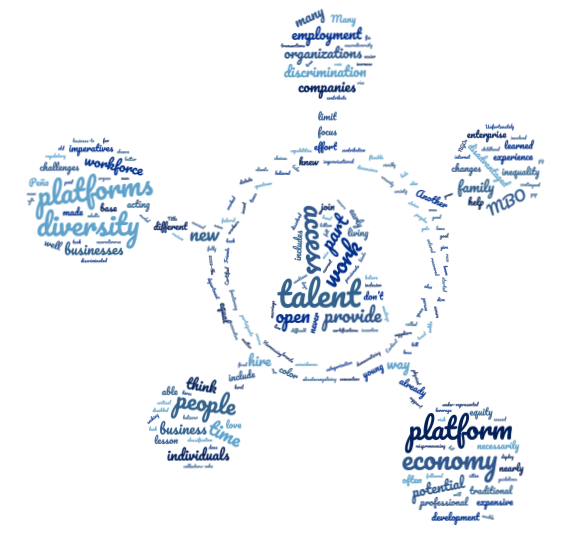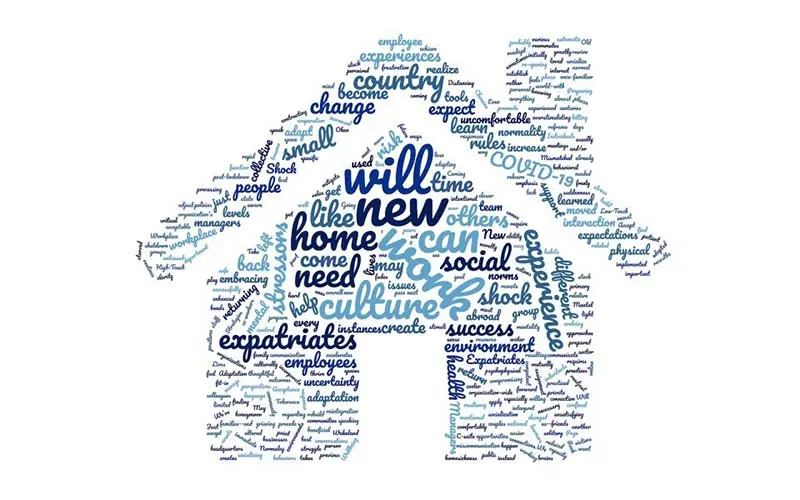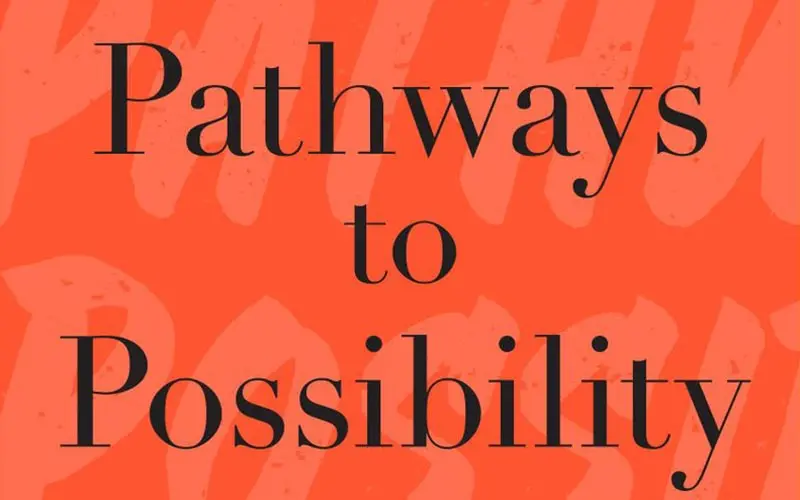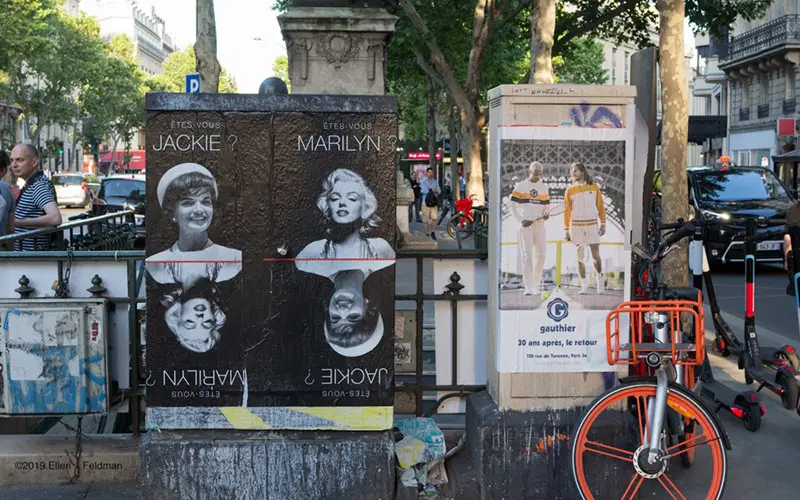Opportunity: How can we harness greater freelance participation to drive more diversity into the workforce as it is being reshaped?
“Never in human history have there been more options for people to work the way they want. The platform economy is a true democratizing agent in the global space. Unfortunately, entire swaths of individuals are missing out and will continue to miss out in the workforce of tomorrow if we don’t make a concerted effort to include them.”
– Bryan Peña, MBO Partners
The spotlight on diversity and inclusion has been on larger companies. In June about a quarter of S&P100 index companies said they would be willing to provide a full copy of their U.S. Equal Employment Opportunity Commission ( EEO-1) report-a breakdown of demographics at different employment levels in their company-to the public. Many promised to redress hiring and promotion imbalances.
But in 2020 nearly half of all American workers are not in such employment structures. The diversity spotlight, therefore, should also shine on the gig economy (also named contingent work, open talent, or the “human cloud”). Due to Covid-19 an additional 12% of the workforce joined the freelance movement in 2020, most not by choice. The move to remote work makes it possible to hire individuals unable or unwilling to move and/or live in expensive cities. The talent platform business is expected to boom when companies recover and seek more flexible talent and more diverse talent.
This means that the nearly 500 online employment platforms for open talent in the U.S. could help firms access such talent, but as yet few of their leaders seem focused on helping companies do so as a way to reduce inequality of opportunity and increase employee diversity. MBO Partners’ Bryan Peña is an exception.
Washing dishes and believing in the power of opportunity
Like other leaders in our “Diversity Inside & Out” series, Peña’s childhood and early professional choices shaped his focus on empathy and access. Growing up in a suburban family with a Hispanic background, Peña knew that in some ways he was different, even if he never necessarily felt discriminated against outright. “At the time, where I grew up there were not a lot of brown kids but I never felt judged by my peers at all. That being, said there were more than a few times where certain adults did treat me differently. I vividly remember always being followed by security guards when I entered a neighborhood store alone.”
His parent’s marriage dissolved when he was young and his mom worked multiple jobs. Early memories include dodging bill collectors-who made it easier by mispronouncing the family name-and a first job as dishwasher when he was 13. “My personal experience has made me a passionate believer in the power of opportunity,” he said. “The greatest contribution you can make to another is to provide him or her with the opportunity to make a living. That’s my connection to diversity and inclusion.”
Passing up a part in Friends and learning to hire the person, not the resume
A major back operation left Peña’s young family in dire straits after an unsuccessful stint trying to break into Hollywood acting. In what he described a “ crazy combination of coincidences,” a Universal executive he knew from his acting days took a risk on Peña and hired him for a new department at the studio called Strategic Sourcing. “We hire the person,” Peña learned, “not the resume.”[1] And that we all need someone to take a chance on us. Another early lesson came from passing up a part in the hit show Friends because he feared his boss would not give him the time off (he would have). He learned that good firms support professional and personal success.
He brought this spirit to Staffing Industry Analysts, where Peña crafted the Certified Contingent Workforce Professional program, and decade later, in 2019, he joined MBO Partners, the leading platform for the independent economy. MBO generated nearly $1 billion in revenues and operated more than 60 brands, with up to 10,000 professionals working on the platform at any given moment. MBO founder Gene Zaino believed (in 1996) that people should be empowered to do the work they love to do the way they want to do it-a mantra that recurs in many meetings and decisions today. Peña leads MBO’s overall market strategy, partnership development, business development, and enterprise thought leadership capabilities.
Defining the “Certified Self-Employed”
When we asked him this spring why there aren’t many open talent platforms that source and place diverse talent, he set to work on it.
MBO had for some time been evangelizing for changes to the regulatory regime for open talent and had developed a rubric that would allow workers to confirm that they are indeed valid independent businesses and eligible to work as their own microbusiness. The Certified Self Employed (CSE) status would allow independent professionals to certify their status to as independent contractors and hopefully minimize the potential risks that may come when enterprises engage independent talent.
Using this framework as a base, Peña has been seeking to develop a similar classification for diverse status in the open talent economy. There is a patchwork quilt of NGOs that provide certification guidance for business owners as well as state and federal guidelines related to the potential for discrimination against certain types of businesses. Many of these same laws dictate diversity and potential discrimination in their full-time hires as well. But in today’s evolving workplace these can fall short.
Many organizations’ diversity programs encourage them to work with disadvantaged business entreprises[1], but those programs often stop at the ownership level and diverse supplier certifications can be expensive and difficult to obtain. But platform businesses are not traditional suppliers and platform participants who provide services are not necessarily employees but may in fact be acting as independent businesses.
The open talent model is unlike traditional work in this regard. It is partly business-to-business transactions and partly employment based on the individual engagement. This leaves many areas of business exposed and uncertain, faced with having to comply with potentially thousands of rules and regulations- sometimes at odds with each other.
Harnessing the open talent economy for all talent
Peña argues that ensuring that the open talent economy enables equal participation and access is critical to a fully functioning society:
Open talent platforms can reimagine the way work gets done, and people-no matter what their challenges-can make their living and provide for the ones they love. We need to ensure that there is equal opportunity for diverse business owners to compete.
At the same timenew evolving platform businesses need to make sure they incorporate policies and procedures to provide opportunities for diverse participants.This starts with making it easier for diverse business owners to launch and own an independent business, to create opportunity for all — which is MBO’s mantra. It also includes an imperative to be broadly inclusive of under-represented minorities, members of the LGBTQ+ communities, indigenous peoples, the disabled, people in disadvantaged neighborhoods, and the neurodiverse.
Soon freelancers will account for the majority of the workforce in the U.S. How can we harness the transformation of work toward greater freelance participation to drive more diversity into the workforce as it is being reshaped? What is the role of talent platforms, the talent who join them, and the companies who use them in harnessing this opportunity and making Peña’s dream come true?




